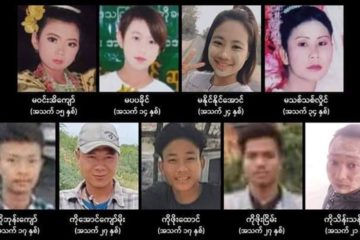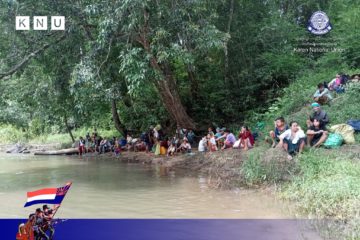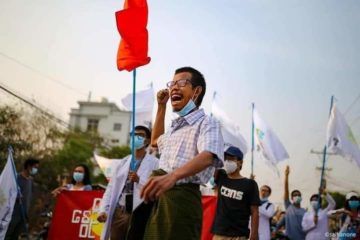
Why China fears a Milk Tea
The Milk Tea Alliance takes its name from the milky sweet tea that is drunk in various South-East Asian countries. Just like the way each country differs in its culture and language, the way the tea is concocted in each country is different. In Taiwan, it is drunk with tapioca pearls, while in Thailand, it is iced and sweetened. In Myanmar it’s usually hot and sweet-ened with condensed milk. However, what unites the pan-regional groups of young people in their teens and 20s, is their unhappiness against authoritarian rule, and underlining sentiment concerning Beijing’s expanding and oppressive shadow over the region.
The term Milk Tea Alliance then picked up in April 2020, when a Thai actor and his girlfriend came under fire from Chinese nationalists for tweeting a pro-independence for Hong Kong post, and his fans fought back. Hong Kong and Taiwan online activists sided with the Thai netizens. A Milk Tea meme was created. A movement was born. The most recent surge in activism within the Milk Tea Alliance is after the Myanmar military staged a coup d’ètat in Naypyitaw on the 1st of February 2021.
Pro-democracy movements against repressive regimes are nothing new in Asia. Many protesters have been met with brutality, forced disappearances and arrests often without a trial or tried unfairly in court. The youth involved are fully aware of what the consequences maybe if they get caught. But what distinguishes the Milk Tea Alliance from previous protests is its loud online presence, that even Twitter has recognised it and given it an emoji on the 8th of April 2021.
Authoritarian regimes have always tried to control information including online content and availability within countries; but outside their firewalls, the internet is difficult to control. This is shown by how much the Burmese diaspora in foreign countries have continued to amplify the voices of those inside Myanmar by sharing as much news and information as possible to the international community, despite the internet shutdown within Myanmar, Then news from abroad is channelled to those inside Myanmar together with words of encouragement and moral support.
Milk Tea Alliance activists can speak out for their fellow comrades in different countries e.g. Thai youth promoting Hong Kong’s struggle without being in fear of the new draconian national (Chinese) security law, and Hong Kong protesters vice versa can speak out against the Thai monarchy without being subjected to fear over facing trials of defamation against the king. They feel strength in numbers, and appreciate solidarity over the same values. The movement seems also to be reaching out from its original base in Asia, from Thailand, Taiwan, Indonesia, Malaysia, Philippines, Vietnam to the US, Catalonia, Nigeria and Belarus.
This solidarity has seen its apex when the movement took it to the streets on February 28th. Thousands of young women and men all around Southeast Asia showed solidarity with their Burmese comrades. From Bangkok to Jakarta, from Hong Kong to Taiwan, everyone was calling for the return of a civilian government in Myanmar. Unfortunately these protests also shared the same violent crackdowns by security forces.On April 24th in Jakarta, when Min Aung Hlaing landed to attend the ASEAN meeting, he was met by large protests just as if he were in Yangon. Indonesian activists and lawyers were arrested, a sign that the Alliance is not welcomed anywhere in Southeast Asia.
The Milk Tea Alliance is propelled by the Asian youth who had come of age amid China’s rising influence in the region and are technology-savvy. Their shared protest symbol, the famous three-fingered salute from Hollywood’s “The Hunger Games”, is now widely seen and used by politicians, CDM staff, and throughout various generations all over in Myanmar against the military junta.The activists cooperate between each other by sharing information. For example, in Myanmar on where to evade the security forces, boycotting Myanmar military and Chinese products, condemning the news that Karen refugees were being forced back by the Thai military at the border, etc. A manual written for tactics used in protests in Hong Kong has been translated into different languages and shared amongst the alliance. Protesters are also brought to closer proximity, via the internet, with politicians and human rights organisations, almost unachievable to ordinary civilians in the past.
The Milk Tea Alliance is a headache for the Myanmar junta. It has no trackable geopolitical base and is leaderless. Some activists’ names are more prominent than others but effectively it is a coalition of young people organising anonymously amongst themselves. The Chinese government is also not in favour of the alliance, unsurprisingly, calling it biased. It clearly sees this movement as a threat to its soft power in a region that has always been heavily influenced by Beijing. The Milk Tea Alliance has demonstrated that it is fighting against the authoritarian rule of countries such as China’s but, as they themselves stressed, using Western democratic principles with more proactivity.
The Spring revolution in Myanmar matters inside and outside of the country. A success in Myanmar would surely galvanize pro-democracy movements in Asia. It’s probably the best example of how internet is able to create connections that can change the world.
“Injustice anywhere is a threat to justice everywhere”-Nathan Law, a Hong Kong pro-democracy activist tweeted, quoting Martin Luther King.
“Unless someone like you cares a whole awful lot, nothing is going to get better. It’s not.”-Dr. Seuss, from The Lorax.
https://thediplomat.com/2021/03/asias-youth-in-revolt/
https://www.bbc.com/news/world-asia-56676144
https://ilmanifesto.it/milk-tea-alliance-prima-volta-in…/
https://time.com/5904114/milk-tea-alliance/
https://www.economist.com/…/what-is-the-milk-tea-alliance




0 Comments